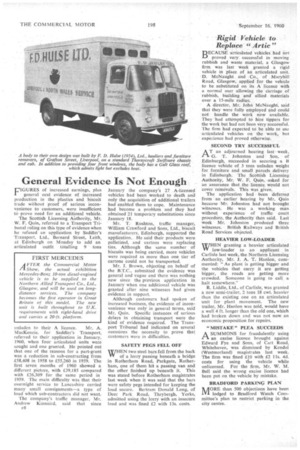General Evidence Is Not Enough
Page 98

If you've noticed an error in this article please click here to report it so we can fix it.
FIGURES of increased earnings, plus general oral evidence of increased production in the plastics and biscuit trade without proof of serious inconvenience to customers, were insufficient to prove need for an additional vehicle.
The Scottish Licensing AUthority, Mr. W. F. Quin, referred to a Transport Tribunal ruling on this type of evidence when he refused an application by Saddler's Transport, Ltd., Bernard Street, Leith, at Edinburgh on Monday to add an articulated outfit totalling 9 • tons unladen to their A licence. Mr. A.
MacKenzie. for Saddler's Transport, referred to their application in January, 1960, when four articulated units were sought and one granted. He pointed out that one of the reasons for a part-grant was a reduction in sub-contracting from £58,408 in 1958 to £55,260 in 1959. The first seven months of 1960 showed a different picture, with £39,185 compared with £26,309 for the same period in 1959. The main difficulty was that their overnight service to Lancashire carried many small consignments—a type of load which sub-contractors did not want.
The company's traffic manager, Mr. Andrew Kinnaird, said that since
F8
January the company's 27 A-licensed vehicles had been worked to death and only the acquisition of additional trailers had enabled them to cope. Maintenance had become a problem and they had obtained 21 temporary substitutions since January 18.
Mr. T. Rushton, traffic manager, William Crawford and •Sons, Ltd., biscuit manufacturers, Edinburgh, supported the application. He said their products were palletized, and cartons were replacing tins. Although the same number of biscuits was being carried, more vehicles were required as more than one tier of cartons could not be transported.
Mr. I. Brown, objecting on behalf of the 13,T.C„ submitted the evidence was general and vague and there was nothing new since the previous application in January when one additional vehicle was granted after nine witnesses had given evidence in support.
Although customers had spoken of increased business, the evidence of inconvenience was only in general terms, said Mr. Quin. Specific instances of serious delays in obtaining transport were the kind of evidence required. The Transport Tribunal had indicated on several occasions the necessity to prove that customers were in difficulties.
SAFETY PEGS FELL OFF
WHEN two steel bars fell from the back of a lorry passing beneath a bridge in Rotherham Road, Parkgate, Rotherham, one of them hit a passing van and the other finished up beneath it. This was stated before Rotherham magistrates last week when it was said that the bars were safety pegs intended for keeping the load secure. Bertram Donald Long, of Deer Park Road, Thrybergh, Yorks, admitted using the lorry with an insecure load and was fined 12 with 13s. costs.




































































































































































































































